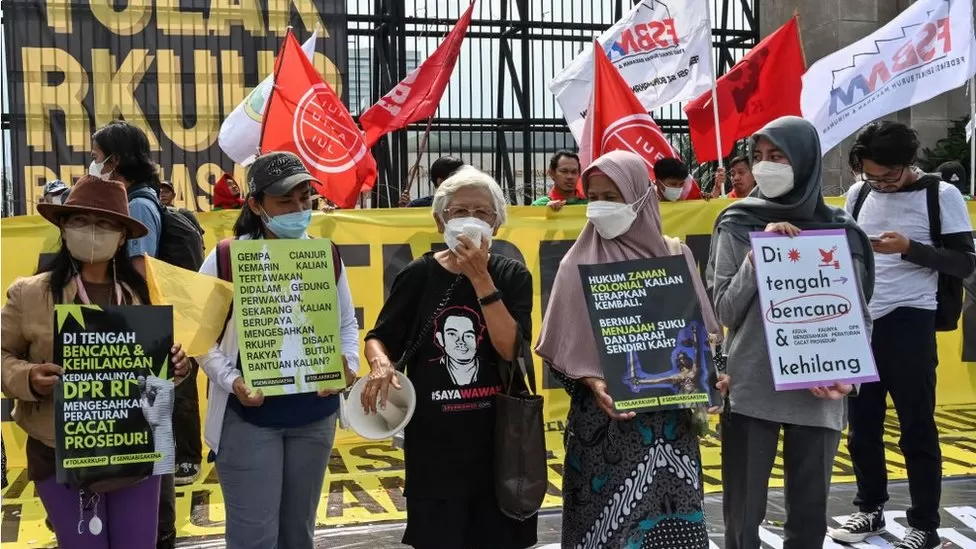Indonesia passes criminal code banning sex outside of marriage
Under the new laws - which will also apply to foreigners visiting Bali and other Indonesian holiday destinations - unmarried couples can be jailed for up to a year for having sex.

Indonesia's parliament has approved a new criminal code that bans anyone in the country having sex outside marriage and restricts political freedoms.
The new laws won't come into effect for another three years, and it's expected there will be court challenges.
The raft of changes come after a rise in religious conservatism in the Muslim-majority country.
Several groups of mainly young people protested against the laws outside parliament in Jakarta this week.
Under the new laws - which will also apply to foreigners visiting Bali and other Indonesian holiday destinations - unmarried couples can be jailed for up to a year for having sex.
They are also banned from living together - an act for which people could be jailed for up to six months. Adultery will also be an offence for which people can be jailed.
Ajeng, a 28-year-old Muslim woman living in the West Java city of Depok, said she was now at risk for living with her partner for the past five years.
"With the new law, both of us can go to jail if one of the family decides to make a police report," she told the BBC.
"What if there's one family member who has a problem with me and decides to send me to jail?
"I think living together or having sex outside of marriage is not a crime. In my religion, it's considered a sin. But I don't think the criminal code should be based on a certain religion."
She said she had joined the nationwide protests in 2019 when the law had first been broached. She took the sign: "For the right to cuddle, I took to the streets."
However on Tuesday, parliament unanimously approved the new code of over 600 articles.
Rights groups say the new provisions disproportionately affect women, LGBT people and ethnic minorities among the population of 267 million people.
It contains scores of new clauses criminalising immorality and blasphemy and restricting political and religious expression. Critics say the changes are a "disaster" for human rights.
Human Rights Watch's Asia Director Elaine Pearson told the BBC it was a "huge setback for a country that has tried to portray itself as a modern Muslim democracy".
The group's Jakarta-based researcher, Andreas Harsano, said there were millions of couples in Indonesia without marriage certificates "especially among Indigenous peoples or Muslims in rural areas" who had married in specific religious ceremonies.
"These people will be theoretically breaking the law as living together could be punished up to six months in prison," he told the BBC.
He added that research from Gulf states, where there are similar laws governing sex and relationships, showed women were punished and targeted by such morality laws more than men.
There are now also six blasphemy laws in the code, including apostasy - renouncing a religion. For the first time since its independence, Indonesia will make it illegal to persuade someone to be a non-believer.
New defamation articles also make it illegal for people to insult the president or criticise state ideology.
However legislators said they had added defences for free speech and protests made in the "public interest".
Since Indonesia's democratic transition in 1998, strict religion-based laws on sex and relationships have been introduced in some parts of the country.
The province of Aceh already enforces strict Islamic law and has punished people for gambling, drinking alcohol and meeting members of the opposite sex.
Many Islamic civil groups in Indonesia have been pushing for more influence in shaping public policy in recent years.
Lawmakers on Tuesday praised the achievement of passing a new criminal code, one which had not been thoroughly revised since Indonesia became independent from Dutch rule.
A previous draft of the code was set to be passed in 2019 but sparked nationwide protests with tens of thousands taking part in demonstrations.
Many, including students, took to the streets and there were clashes with police in Jakarta.
Ajeng said many Indonesians who were not affected by the law had also protested in 2019 because "people don't want their taxes to be used to send people to jail just for sex".
"People are angry that their liberty is being taken. Indonesia has plenty of problems like poverty, climate change and corruption, but instead of solving a problem they've created a bill that only adds to the problem."


